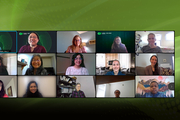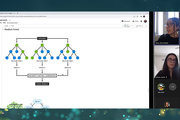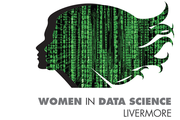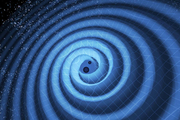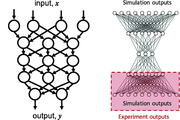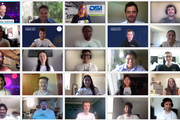Did you know we have a monthly newsletter? View past volumes and subscribe.
Understanding the universe with applied statistics (VIDEO)
Nov. 17, 2022 -
In a new video posted to the Lab’s YouTube channel, statistician Amanda Muyskens describes MuyGPs, her team’s innovative and computationally efficient Gaussian Process hyperparameter estimation method for large data. The method has been applied to space-based image classification and released for open-source use in the Python package MuyGPyS. MuyGPs will help astronomers and astrophysicists...
ESGF launches effort to upgrade climate projection data system
Oct. 5, 2022 -
The Earth System Grid Federation (ESGF), a multi-agency initiative that gathers and distributes data for top-tier projections of the Earth’s climate, is preparing a series of upgrades that will make using the data easier and faster while improving how the information is curated. The federation, led by the Department of Energy’s Oak Ridge National Laboratory in collaboration with Argonne and...
Scientific discovery for stockpile stewardship
Sept. 27, 2022 -
Among the significant scientific discoveries that have helped ensure the reliability of the nation’s nuclear stockpile is the advancement of cognitive simulation. In cognitive simulation, researchers are developing AI/ML algorithms and software to retrain part of this model on the experimental data itself. The result is a model that “knows the best of both worlds,” says Brian Spears, a...
Introduction to deep learning for image classification workshop (VIDEO)
July 6, 2022 -
In addition to its annual conference held every March, the global Women in Data Science (WiDS) organization hosts workshops and other activities year-round to inspire and educate data scientists worldwide, regardless of gender, and to support women in the field. On June 29, LLNL’s Cindy Gonzales led a WiDS Workshop titled “Introduction to Deep Learning for Image Classification.” The abstract...
Kevin McLoughlin applies computational biology to complex problems
May 17, 2022 -
Kevin McLoughlin has always been fascinated by the intersection of computing and biology. His LLNL career encompasses award-winning microbial detection technology, a COVID-19 antiviral drug design pipeline, and work with the ATOM consortium. The appeal for him in these projects lies at the intersection of computing and biology. “I love finding ways to visualize data that reveal relationships...
Accelerating the path to precision medicine
March 22, 2022 -
LLNL joined the Transforming Research and Clinical Knowledge in Traumatic Brain Injury (TRACK-TBI) consortium in 2018. The national, multiyear, multidisciplinary effort, led by the University of California at San Francisco in collaboration with Lawrence Berkeley and Argonne national laboratories and other leading research organizations and universities, combines neuroimaging, blood-based...
Livermore WiDS provides forum for women in data science
March 18, 2022 -
LLNL celebrated the 2022 Global Women in Data Science (WiDS) conference on March 7 with its fifth annual regional event, featuring workshops, mentoring sessions and a discussion with LLNL Director Kim Budil, the first woman to hold that role. For the second straight year, the WiDS Livermore event was entirely virtual due to the COVID-19 pandemic. Attendees tuned in to view talks and...
Machine learning model finds COVID-19 risks for cancer patients
March 10, 2022 -
A new study by researchers at LLNL and the University of California, San Francisco, looks to identify cancer-related risks for poor outcomes from COVID-19. Analyzing one of the largest databases of patients with cancer and COVID-19, the team found previously unreported links between a rare type of cancer—as well as two cancer treatment-related drugs—and an increased risk of hospitalization...
Winter hackathon meets WiDS datathon
March 9, 2022 -
Sponsored by the DSI, LLNL’s winter hackathon took place on February 16–17. Hackathons are 24-hour events that encourage collaborative programming and creative problem solving. In addition to traditional hacking, the hackathon included a special datathon competition in anticipation of the Women in Data Science (WiDS) conference on March 7. Hackathon and datathon participants presented their...
WiDS Livermore returns on March 7
Feb. 10, 2022 -
We are hosting our 5th WiDS Livermore regional event to encourage our community of women in computing. We will watch the WiDS Stanford Livestream as well as feature Lab-focused technical talks, mentoring breakout sessions, and a career panel.
WiDS Livermore is an independent event hosted by LLNL Ambassadors as part of the annual Women in Data Science (WiDS) Worldwide conference organized by...
COVID-19 R&D: Computing responds to pandemic
Jan. 19, 2022 -
When the COVID-19 pandemic began, the Laboratory immediately started seeking solutions to the myriad challenges posed by the global crisis. The Computing Directorate jumped right in with research and development activities that combine molecular screening to inform antiviral drug experimentation; a generative molecular design software platform to optimize properties of antiviral drugs; an...
LLNL-led team uses machine learning to derive black hole motion from gravitational waves
Nov. 9, 2021 -
To understand the motion of binary black holes, researchers have traditionally simplified Einstein’s field equations and solved them to calculate the emitted gravitational waves. The approach is complex and requires expensive, time-consuming simulations on supercomputers or approximation techniques that can lead to errors or break down when applied to more complicated black hole systems.
Alo...
Building confidence in materials modeling using statistics
Oct. 31, 2021 -
LLNL statisticians, computational modelers, and materials scientists have been developing a statistical framework for researchers to better assess the relationship between model uncertainties and experimental data. The Livermore-developed statistical framework is intended to assess sources of uncertainty in strength model input, recommend new experiments to reduce those sources of uncertainty...
Summer scholar develops data-driven approaches to key NIF diagnostics
Oct. 20, 2021 -
Su-Ann Chong's summer project, “A Data-Driven Approach Towards NIF Neutron Time-of-Flight Diagnostics Using Machine Learning and Bayesian Inference,” is aimed at presenting a different take on nToF diagnostics. Neutron time-of-flight diagnostics are an essential tool to diagnose the implosion dynamics of inertial confinement fusion experiments at NIF, the world’s largest and most energetic...
Tackling the COVID-19 pandemic
Oct. 11, 2021 -
To help the U.S. fight the COVID-19 pandemic, LLNL did what it does best: quickly bring together interdisciplinary teams and diverse technologies to address urgent national challenges. This effort includes applying advanced high-performance computing resources to biological research and anayzing complicated computer models and enormous datasets. Read more in Science & Technology Review.
Data Science Challenge welcomes UC Riverside
Oct. 11, 2021 -
Together with LLNL’s Center for Applied Scientific Computing (CASC), the DSI welcomed a new academic partner to the 2021 Data Science Challenge (DSC) internship program: the University of California (UC) Riverside campus. The intensive program has run for three years with UC Merced, and it tasks undergraduate and graduate students with addressing a real-world scientific problem using data...
60 years of cancer research
Sept. 10, 2021 -
From studying radioactive isotope effects to better understanding cancer metastasis, the Laboratory’s relationship with cancer research endures some 60 years after it began, with historical precedent underpinning exciting new research areas. In one Cancer Moonshot project, research includes a close synergy between experiments and computation, allowing scientists to get a better picture of the...
New machine-learning tactic sharpens NIF shot predictions
July 8, 2021 -
Inertial confinement fusion (ICF) experiments at LLNL's National Ignition Facility (NIF) are extremely complex and costly, and it is challenging to accurately and consistently predict the outcome. But that is now changing, thanks to the work of design physicists. In a paper recently published in Physics of Plasmas, design physicist Kelli Humbird and her colleagues describe a new machine...
Career panel series kicks off with women in Computing leadership roles
July 6, 2021 -
More than 100 LLNL staff and students gathered virtually for the first session of a new career panel series inspired by the annual WiDS conference and sponsored by the DSI. Panelists discussed how they have shaped their careers at the Lab and in Computing, their journeys into leadership roles, and how they navigate career challenges. Data scientist and panel series organizer Cindy Gonzales...
Virtual LLNL-UC Merced Data Science Challenge tackles asteroid detection though machine learning
June 25, 2021 -
Over three weeks, students from the University of California, Merced collaborated online with mentors at LLNL to tackle a real-world challenge problem: using machine learning to identify potentially hazardous asteroids that could pose an existential threat to humanity. Throughout the event, the teams tackled problems around the theme of “Astronomy for Planetary Defense.” For the main...







